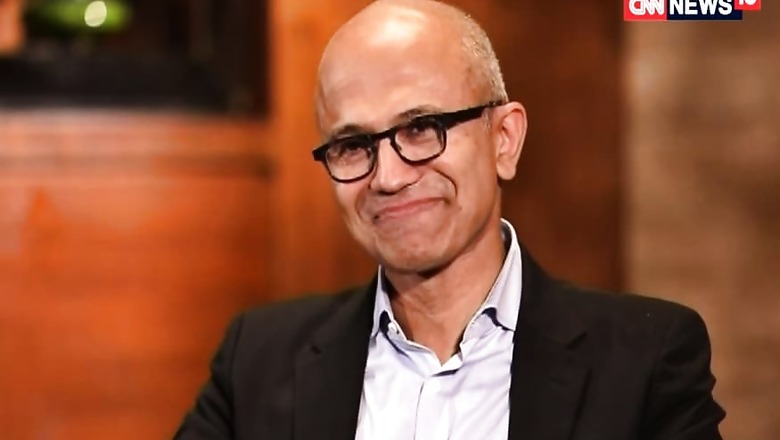
views
Kolkata: Expressing disappointment over the amended Citizenship Act, Microsoft CEO Satya Nadella said that he would love to see a Bangladeshi immigrant help create the next unicorn in the country or become the CEO of Infosys.
Quoting Indian-born Nadella, Ben Smith, Editor-in-Chief of online website BuzzfeedNews, said on Monday, "I think what is happening is sad... It's just bad.... I would love to see a Bangladeshi immigrant who comes to India and creates the next unicorn in India or becomes the next CEO of Infosys."
Asked Microsoft CEO @satyanadella about India's new Citizenship Act. "I think what is happening is sad... It's just bad.... I would love to see a Bangladeshi immigrant who comes to India and creates the next unicorn in India or becomes the next CEO of Infosys" cc @PranavDixit— Ben Smith (@BuzzFeedBen) January 13, 2020
Smith said Nadella made the observation while speaking to editors at a Microsoft event in Manhattan on Monday morning.
Hours later, noted historian Ramachandra Guha, who was last month detained while participating in a protest against CAA in Bengaluru, lauded Nadella for his stand. "I am glad Satya Nadella has said what he has. I wish that one of our own IT czars had the courage and wisdom to say this first. Or to say it even now," he tweeted.
I am glad Satya Nadella has said what he has. I wish that one of our own IT czars had the courage and wisdom to say this first. Or to say it even now. https://t.co/KsKbDUtMQk— Ramachandra Guha (@Ram_Guha) January 13, 2020
Later, in a statement issued by Microsoft India, Nadella said: "Every country will and should define its borders, protect national security and set immigration policy accordingly. And in democracies, that is something that the people and their governments will debate and define within those bounds."
"I’m shaped by my Indian heritage, growing up in a multicultural India and my immigrant experience in the United States. My hope is for an India where an immigrant can aspire to found a prosperous start-up or lead a multinational corporation benefitting Indian society and the economy at large".
Statement from Satya Nadella, CEO, Microsoft pic.twitter.com/lzsqAUHu3I— Microsoft India (@MicrosoftIndia) January 13, 2020
A group of over 150 Indian-origin professionals employed with Google, Facebook, Uber and Amazon had earlier written an open letter against the Act and a possible nationwide National Register of Citizens, calling both the initiatives as "fascist".
Nobel laureate Amartya Sen also reacted on the protests against amended Act. Stressing on importance of Opposition unity for crucial protests, the Nobel laureate said that togetherness makes the voice stronger. However, he added that even if there's lack of agreement, the stir must go on and whatever is neccessary should be done.
"For a protest, opposition unity is important as protest becomes easier. Unity is important. If protest is for a proper reason but if there's no unity, and we stop protesting, I don't agree to it. If there's no unity we still have to move on whatever is necessary to be done," he said.
Sen's comments came hours after the resolution on amended Citizenship Act by the Congress-led opposition. While leaders of about 20 political parties attended the meet but six major parties — DMK, Samajwadi Party, Bahujan Samaj Party, Trinamool Congress, Aam Aadmi Party and Shiv Sena — chose to stay away.
He had earlier also demanded that the legislation be scrapped. "Under this Act, whether citizenship will be given or not will be decided after ascertaining the religion of a person. This definitely is not in tune with the Constitution," said Sen, who won the Nobel prize in Economics in 1998.
The Centre last week had issued a gazette notification announcing that the CAA has come into effect from January 10, 2020. The Act grants citizenship to persecuted non-Muslim minorities from Pakistan, Bangladesh and Afghanistan.
"In exercise of the powers conferred by sub-section (2) of section 1 of the Citizenship (Amendment) Act, 2019 (47 of 2019), the Central government hereby appoints the 10th day of January, 2020, as the date on which the provisions of the said Act shall come into force," the notification said. The CAA was passed by Parliament on December 11.
According to the legislation, members of Hindu, Sikh, Buddhist, Jain, Parsi and Christian communities who have come from Pakistan, Bangladesh and Afghanistan till December 31, 2014 due to religious persecution will not be treated as illegal immigrants but given Indian citizenship.
















Comments
0 comment